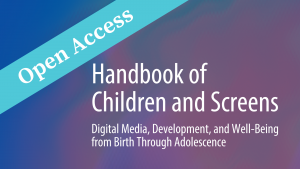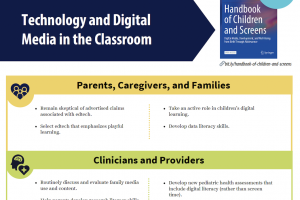
The Covid-19 pandemic and resulting school shutdowns provided an opportunity to see firsthand how different educational technologies could be implemented in children’s learning. As a result, educators are increasingly considering ways to incorporate edtech into their learning plans. Before permanently integrating these technologies into children’s education, however, careful consideration about the limitations of edtech is needed to support children’s growth and well-being. This section of “Handbook of Children and Screens: Digital Media, Development, and Well-Being from Birth Through Adolescence” highlights these concerns, including a lack of research supporting acceptable learning outcomes, questionable data collection and surveillance practices, divides in digital equity, and inappropriate designs for education (e.g., algorithmic biases). The authors also acknowledge that children will need to develop digital literacy skills to safely interact with edtech. Taking these steps will help realize the potentials of edtech and children’s well-being while using it.
Recommendations [ALL]
The following recommendations are excerpts from the "Education Technology" section of the “Handbook of Children and Screens: Digital Media, Development, and Well-Being from Birth Through Adolescence." This open access publication is free to download in full or by individual chapters via the links provided following the recommendations below.
- Routinely discuss and evaluate family media use and content.
- Help parents develop research literacy skills to independently evaluate edtech.
- Develop new pediatric health assessments that include digital literacy (rather than screen time).
- Remain skeptical of advertised claims associated with edtech.
- Select edtech that emphasizes playful learning.
- Take an active role in children’s digital learning.
- Develop data literacy skills.
- Understand the limitations of edtech and adopt critical pedagogies.
- Evaluate edtech programs for quality, evidence, and effectiveness.
- Proactively develop flexible curricula and policies for learning interruptions.
- Adopt systems-level, evidence-based approaches when incorporating digital tech into education.
- Leverage technology to enhance student voices and autonomy.
- Provide children with opportunities to evaluate and make decisions about edtech.
- Allow students to be content creators.
- Create and share digital media literacy resources for students and families.
- Limit data stored on platforms and LMS systems to safeguard student privacy.
- Determine who is being served by edtech and address structural reasons for inequities.
- Create equitable school funding models for edtech implementation.
- Ensure each student has access to high-speed internet connectivity and a computing platform.
- Protect students from advertising and data collection on educational platforms.
- Democratize and make transparent edtech vending and purchasing decisions.
- Increase regulation of edtech businesses and require prioritization of children’s well-being and privacy.
- Require edtech companies to meet commonly agreed-on standards.
- Support digital media literacy programs and training infrastructure.
- Focus on child-centered designs.
- Collaborate with key stakeholders and researchers to ensure evidence-based designs.
- Share product effectiveness assessments with key stakeholders.
- Consider the incorporation of team roles focused on data and design responsibility.
- Determine how edtech can enhance learning adaptability.
- Partner with developers to evaluate edtech products for improvement.
- Stay abreast of new technologies and media, as well as their uses for education.
- Use a neuroscience perspective to approach children’s digital media use research.
- Explore the benefits and risks of edtech in a balanced manner that acknowledges diverse experiences and complex structural nuances.
Education Technology Section Chapters
Introduction to the Section on Education Technology
Jennifer Suzzane Darling-Aduana, PhD
The State of Educational Technology Research and Practice
Daniel G. Krutka, PhD, Christine Greenhow, EdD, Royce Kimmons, PhD, Luci Pangrazio, PhD, Torrey Trust, PhD
Education Technology During the Pandemic and Future Emergencies
Justin Reich, EdD, Cristóbal Cobo, PhD, Sarah Dryden-Peterson, EdD, Eric Klopfer, PhD, Anya Kamenetz, BA, Torrey Trust, PhD
Digital Ethics and Equity in K-12 Blended and Online Learning
Jennifer Suzzane Darling-Aduana, PhD, Marie K. Heath, EdD, Ashley Stewart, PhD, Samantha Viano, PhD, Sumreen Asim, PhD, Antero Garcia, PhD, Elizabeth Langran, PhD, Carolyn Heinrich, PhD, Xeturah Woodley, PhD
The Importance of Digital Media Literacy
Kristen Hawley Turner, PhD, Bobbie Eisenstock, PhD, Troy Hicks, PhD, Tessa Jolls, PhD, W. Ian O’Byrne, PhD, Katie Paciga, PhD, Detra Price-Dennis, PhD, Michelle Schira Hagerman, PhD
The Explosion of Ed Tech: Can Its Promise Be Fulfilled?
Roberta Michnick Golinkoff, PhD, Brenna Hassinger-Das, PhD, Natalia Kucirkova, PhD, Lauren Myers, PhD, Rebecca A. Dore, PhD
Children, Education, and Technologies: Current Debates, Key Concerns, Future Directions Around Data Privacy, Surveillance and Datafication
Velislava Hillman, PhD, Jamie Manolev, PhD, Samantha-Kaye Johnston, PhD, Priya C. Kumar, PhD, Florence Martin, PhD, Elana Zeide, PhD, Gergana Vladova, PhD, Rina Lai, PhD, FRSA






